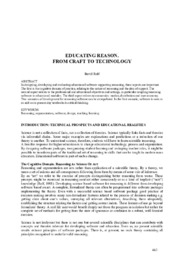| dc.contributor.author | Rolf, Bertil | en |
| dc.coverage.spatial | CY - Λευκωσία | en |
| dc.creator | Rolf, Bertil | en |
| dc.date.accessioned | 2016-02-18T10:46:07Z | |
| dc.date.available | 2016-02-18T10:46:07Z | |
| dc.date.issued | 2003 | |
| dc.identifier.uri | http://hdl.handle.net/10797/14726 | en |
| dc.description | Περιέχει το πλήρες κείμενο | el |
| dc.description.abstract | In designing, developing and evaluating educational software supporting reasoning, three aspects are important. The first is the cognitive domain of practice, relating to the nature of reasoning and the idea of support. The second aspect relates to the professional and educational objectives and settings, in particular coupling reasoning software to educational modules. The third aspect relates to economics: market, distribution and user economy. Two scenarios of development for reasoning software can be extrapolated. In the first scenario, software is seen as an add-on to present day textbooks in critical thinking. | en |
| dc.language.iso | eng | en |
| dc.publisher | Department of Educational Sciences, University of Cyprus | en |
| dc.relation.ispartof | Computer based learning | en |
| dc.rights | info:eu-repo/semantics/openAccess | en |
| dc.rights | Open Access | en |
| dc.source | CBLIS Conference Proceedings 2003 Volume I: New Technologies and their applications in education | en |
| dc.title | Educating reason. From craft to technology | en |
| dc.type | info:eu-repo/semantics/conferenceObject | en |
| dc.subject.uncontrolledterm | Reasoning | en |
| dc.subject.uncontrolledterm | Argumentation | en |
| dc.subject.uncontrolledterm | Software | en |
| dc.subject.uncontrolledterm | Design | en |
| dc.subject.uncontrolledterm | Teaching | en |
| dc.subject.uncontrolledterm | Learning | en |
| dc.contributor.conferenceorganizer | Learning in Physics Group, University of Cyprus | en |
| dc.contributor.coordinator | Constantinou, Constantinos P. | en |
